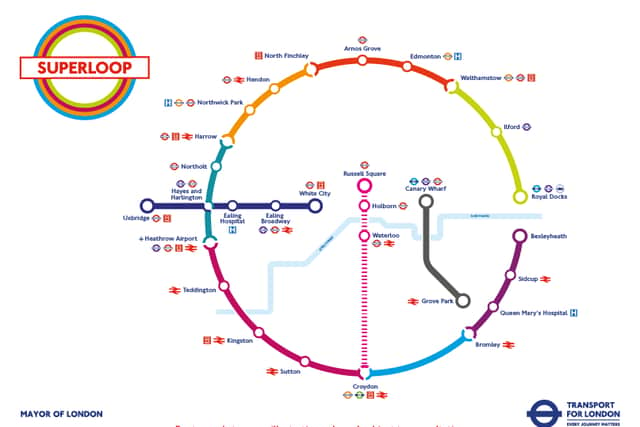TfL Superloop: Extra ‘£500m-£600m’ needed for whole bus fleet to be zero-emission by 2030
and live on Freeview channel 276
Transport for London (TfL) anticipates it will need an additional £500m-£600m to meet its target of running a 100% zero-emission bus fleet by 2030, a finance chief has said.
Patrick Doig, chief finance officer at TfL, confirmed during a London Assembly Budget and Performance Committee meeting on Tuesday that the authority was currently forecast to hit the target in 2034.
Advertisement
Hide AdAdvertisement
Hide AdTo accelerate the timeline to 2030, Mr Doig said TfL expects it will require a further £500m-£600m, due to having to retire buses with internal combustion engines early, and because it will need to buy new batteries and buses before the technology has dropped sufficiently in price.
However, he added that projection is “something we are keeping under close review”, due to the fluctuating costs of electricity, fuel, batteries and other components.
A TfL spokesperson told LondonWorld there are currently more than 950 zero-emission buses in London, and that it aims on ensuring the whole fleet is non-polluting by 2034, “or 2030 subject to Government funding”.
Mr Doig told the chamber TfL has been able to draw up some potential costs of inaction and further delay to decarbonising its fleet, such as the impact of hot weather events, which he said can result in “several million pounds per day” in lost revenue due to the network being lower.
Advertisement
Hide AdAdvertisement
Hide Ad“I’m convinced that there’s a very strong business case to pushing forward to 2030,” he said.
A Government spokesperson said: “We have provided TfL with £6bn in funding support to keep public transport moving, as well as £2bn towards vehicle grants and infrastructure to support the rollout of clean vehicles across the country. More specifically, London has received almost £102m of Government funding for projects specifically targeted at helping to tackle pollution. Decisions on how to allocate funding to best meet the city’s transport priorities are for the Mayor of London to make.”
All new Superloop buses to be zero-emission - though ‘some existing low emission buses’ also to be used
Mr Doig spoke about the forthcoming Superloop, acknowledging that, at launch, it will be using some existing polluting buses to service its routes.
Expected to begin operating at the end of 2024, the Superloop’s orbital route is designed to enable passengers to travel easily between outer London boroughs, without first having to head into the city centre.
Advertisement
Hide AdAdvertisement
Hide AdSadiq Khan, the mayor of London, has described it as “ the game-changing new network of express buses that will add over four million additional kilometres to our bus network in outer London, linking stations, town centres, hospitals and transport hubs”.
However, its lack of stops in several boroughs, including Merton and Havering, has raised concerns given the expansion of the Ultra Low Emission Zone (ULEZ) on August 29.


While some of the buses to be used on the route are already in circulation, Mr Doig confirmed additional buses are also being purchased by operators, to ensure the Superloop is adequately serviced.
However, Mr Doig added that while all buses used by TfL have to meet the capital’s emissions standards, he could not confirm all Superloop buses will be zero-emission vehicles.
Advertisement
Hide AdAdvertisement
Hide AdHe said: “All the TfL buses comply with ULEZ, [so] are Euro 6 buses. There is a balance to strike about increasing capacity quickly versus reaching zero emissions. I don’t know the precise sequencing and timing of each route, of each point at which they’ll become zero emissions.”
Questioned about whether enough buses are being purchased, Mr Doig said: “I believe we will have sufficient buses to operate Superloop. Given it’s not us procuring them, that is not a direct risk to TfL’s budget in terms of that expense.”
A TfL spokesperson said every new bus for the Superloop will be a zero-emission vehicle, but that “some existing low emission buses will be used initially”.
They said: “Buses are the quickest, easiest and cheapest way to shift trips made by cars to public transport. Buses carry up to 80 times the number of people as a car, making efficient use of road space, and cut emissions by both taking polluting private vehicles off the roads and offering up a green alternative.
Advertisement
Hide AdAdvertisement
Hide Ad“The Superloop is central to our plans to strengthen alternatives to the private car and is a game changer for outer London. The service will be bringing a number of the capital’s town centres even closer together with express orbital routes, making it much easier for Londoners to get around the capital, and help build a better, greener London for everyone. It will add over 4 million extra kilometres of bus services and complement earlier plans to add over 1 million kilometres to the network.”
Comment Guidelines
National World encourages reader discussion on our stories. User feedback, insights and back-and-forth exchanges add a rich layer of context to reporting. Please review our Community Guidelines before commenting.
